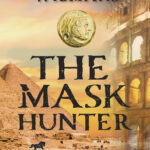“Reflecting on History” by Peter H. Spitz
“I decided that it would be interesting to research and then write a book that lets readers know more about the world at the start of that revolution,” writes Peter H. Spitz, in his new book titled Reflecting on History: How the Industrial Revolution Created Our Way of Life. “…I wanted to identify the most important inventions that occurred at the beginning of the revolution and continued over the following years, until the civilized world looked more or less as it looks today. And thirdly, I wanted to look back from our current life to trace how many of the amenities that we now take for granted (computers, television, antibiotics, synthetic fibers, natural gas heating, etc.) evolved over that time span from first inventions or discovery to the present.”
He also writes regarding the book’s inspiration: “A number of years ago when I did some consulting work for Dupont, I visited the Hagley Museum in Delaware, located where the company built its first gunpowder plant in 1802. I remember thinking at that time how the world
has changed since the time when there was no electricity and grinding energy was supplied by water wheels. Another memory came back to me.
Shortly after we were married, my wife, Hilda and I, picked up her father at JFK airport from a return trip to Germany, where he had been born in 1886. As he got behind the wheel, he reminisced, ‘The automobile has come a long way from the time my own father came back from a trip to Berlin to the little Baltic Island where we were living. We were amazed to hear that there were no horses pulling the carriages along the boulevards. He saw that there were steam engines driving the wheels.’ This was the birth of the automobile.”
AMAZON: https://www.amazon.com/Reflecting-History-Industrial-Revolution-Created-ebook/dp/B0D38RM5JX
Part of Spitz’ effectiveness as a communicator (I prefer ‘communicator’ here, to ‘storyteller’), is highlighting the universality, not just continuity of history. The present and the past share a symbiotic relationship, and through each theme in the book’s chapters this is brilliantly demonstrated time and again. Spitz does this through a degree of evocative word choice, effectively straightforward ideological presentation, and a sense of genuine personal curiosity and conviction. “Many books and articles have been written about the Industrial Revolution and that has greatly helped my research.
However, I have found no books that look at the subject from the same perspective as I have in this book,” Spitz writes, true to aforementioned traits. “I have tried to write for an audience that does not have to be steeped in science and technology, though it was necessary to include some of that to understand the background and scope of the inventions described. Also, the articles, by necessity short, can’t possibly do justice to all the material available to write about them. Readers interested in further exploration will find a host of material in public libraries.”
Spitz has succeeded on that front, with flying colors. Reflecting on History: How the Industrial Revolution Created Our Way of Life lives up to its title, and similar to an MLA paper its title serves as something of a thesis statement. Job well done.
Nicole Killian








